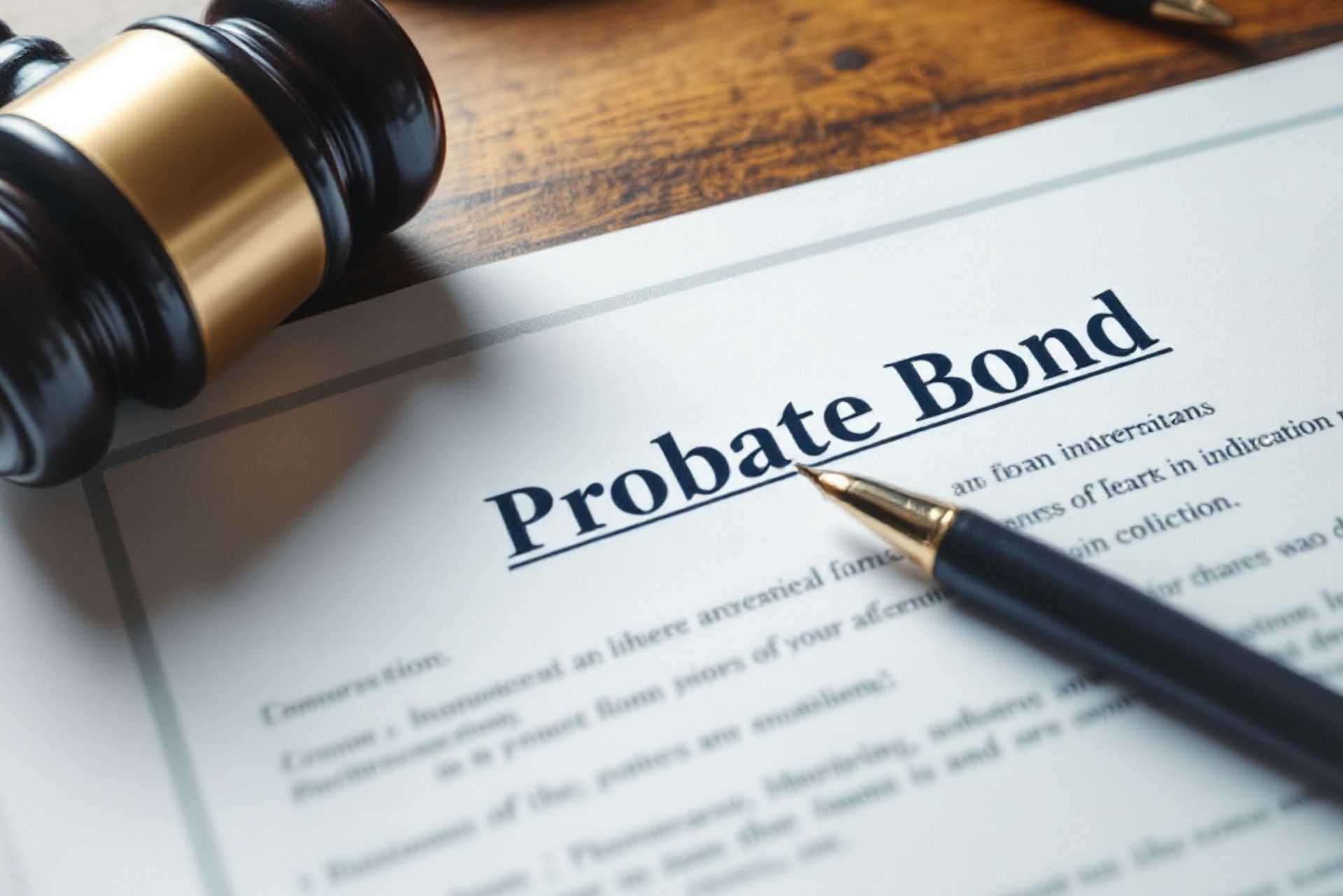
Most Common Business Policies
Index
Contact Us
Probate bonds are an essential aspect of estate administration in New York. They serve to protect the interests of beneficiaries and creditors during the probate process. This article provides a comprehensive overview of probate bonds, their significance, the process of obtaining one, associated costs, misconceptions, and how to tackle challenges related to probate bonds.
Understanding the Basics of Probate Bonds
Before delving into the specifics of probate bonds in New York, it’s crucial to understand what a probate bond is and why it is necessary.
Definition of a Probate Bond
A probate bond, also known as an estate bond or fiduciary bond, is a type of surety bond required by the local probate court. This bond assures that the executor or administrator of the estate will manage the estate's assets responsibly and in accordance with the law. If the fiduciary fails in their duties or commits fraud, the bond protects the estate by compensating the affected parties.
Purpose of a Probate Bond
The primary purpose of a probate bond is to safeguard the estate's assets and ensure a fair distribution to beneficiaries. It also protects creditors by ensuring the executor follows the legal process in settling debts and claims against the estate. Thus, it serves as a financial safeguard for all parties involved in the probate process.
In addition to protecting the estate's assets, probate bonds also help maintain the integrity of the probate process itself. By requiring a bond, the court ensures that only responsible individuals are appointed as executors or administrators. This requirement acts as a deterrent against potential misconduct and encourages fiduciaries to adhere strictly to their legal obligations. Furthermore, the bond provides a level of reassurance to beneficiaries and creditors alike, knowing that there is a financial mechanism in place should any mismanagement occur.
Moreover, the amount of the probate bond is typically determined based on the value of the estate, which can vary significantly from one case to another. In some instances, the bond amount may be set higher to account for specific assets that require careful management, such as real estate or valuable personal property. This variability ensures that the bond is tailored to the unique circumstances of each estate, thereby enhancing the protection it offers to all parties involved. Understanding these nuances can help individuals navigate the complexities of the probate process more effectively.

The Role of Probate Bonds in New York
In New York, probate bonds play a significant role in protecting the interests of the deceased's estate and its beneficiaries. Understanding the legal framework surrounding these bonds is essential for anyone involved in the probate process. These bonds serve not only as a safeguard for the estate but also as a reassurance for beneficiaries who may be concerned about the proper management of their inheritance during what can be a complex and emotional time.
Legal Requirements for Probate Bonds in New York
In New York, the requirement for a probate bond is usually determined by the court. Typically, the executor must post a bond unless waived by the will or consented to by all interested parties. The amount of the bond generally corresponds to the total value of the estate, ensuring that sufficient coverage exists for all beneficiaries and creditors. This requirement is particularly important in cases where the executor may not be a close relative or where there are concerns about the executor's financial stability or ability to manage the estate responsibly. By establishing a bond, the court aims to mitigate potential conflicts and protect the interests of all parties involved.
How Probate Bonds Protect New York Estates
Probate bonds provide a layer of security for the estate by ensuring that the fiduciary manages the assets appropriately. In cases of mismanagement, embezzlement, or failure to follow the court’s orders, the bond provides a financial remedy to those harmed. This protection fosters trust in the probate process, allowing beneficiaries to feel secure about their inheritance. Furthermore, the existence of a probate bond can also expedite the probate process, as it reassures the court and beneficiaries that there is a financial safety net in place. This can be particularly beneficial in larger estates where the stakes are higher, and the potential for disputes may be more pronounced. Additionally, the bond can serve as a deterrent against misconduct, as the executor is aware that their actions are being monitored and that they could face financial repercussions for any wrongdoing.
The Process of Obtaining a Probate Bond in New York
Obtaining a probate bond in New York involves a clear process that aims to provide security for the estate during the probate proceedings. Knowing the steps involved can help simplify the overall experience. This bond acts as a safeguard, ensuring that the executor or administrator will faithfully execute their duties and manage the estate's assets responsibly, thereby protecting the interests of the beneficiaries and creditors alike.
Who Needs to Obtain a Probate Bond?
Probate bonds are typically required for executors and administrators of estates in New York. If the decedent had a will, the nominated executor will need to obtain a bond unless the will specifies otherwise. In intestate cases, the court appoints an administrator, who will universally require a bond before assuming their duties. It’s important to note that beneficiaries of the estate may also request a bond if they feel it necessary to protect their interests, particularly in cases where the executor may not be a close family member or where there is a history of financial mismanagement.
Steps to Acquire a Probate Bond
- Determine the bond amount based on the estate's value.
- Select a surety company, preferably one experienced in probate bonds.
- Complete a bond application, which may require personal and financial information.
- Undergo a background check that the surety company will conduct on the applicant.
- Pay the bond premium, which is a percentage of the total bond amount.
- Submit the bond to the probate court to fulfill the legal requirement.
Each step in this process is crucial and can vary in complexity depending on the specifics of the estate. For instance, when determining the bond amount, it is essential to consider not just the total value of the estate but also any outstanding debts and obligations that may affect the financial landscape. Additionally, selecting a surety company with a solid reputation can significantly influence the ease of the application process; experienced companies often provide guidance and support, helping applicants navigate any potential pitfalls.
Furthermore, the background check conducted by the surety company is an essential part of the process, as it assesses the applicant's financial responsibility and trustworthiness. This step can sometimes lead to delays if there are any discrepancies in the applicant's financial history. Therefore, it’s advisable for applicants to prepare by gathering necessary documentation and being transparent about their financial situation. Once the bond is submitted to the probate court, it marks a significant milestone in the probate process, allowing the executor or administrator to commence their duties with the assurance that they are legally bound to act in the best interests of the estate and its beneficiaries.
Costs Associated with Probate Bonds
The cost of obtaining a probate bond can vary significantly depending on several factors. Understanding these costs will help you budget for this necessary expense.
Factors Influencing the Cost of Probate Bonds
The cost of probate bonds typically depends on various factors, including:
- The total value of the estate
- The applicant's creditworthiness
- The type of bond required
- The bonding company's policies and rates
Generally, premiums can range from one to three percent of the bond's total amount, with lower premiums offered for applicants with good credit histories. Additionally, other elements such as the complexity of the estate and the jurisdiction in which the probate is filed can also impact the cost. For instance, estates that involve multiple beneficiaries or complicated asset distributions may result in higher bond premiums due to the increased risk perceived by the bonding company.
Understanding the Payment Process
Once you acquire a probate bond, it’s essential to understand how the payment process works. Typically, the premium is paid upfront as a one-time fee, though some companies may offer payment plans. Subsequent renewals may also be necessary, depending on the duration of the probate process and the specific requirements set by the court. It's also important to note that in some cases, the court may require the bond to be maintained for a certain period after the estate has been settled, which can lead to additional costs if the bond needs to be renewed.
Moreover, applicants should be aware of the potential for hidden fees associated with the bond application process. These can include administrative fees, underwriting fees, or even costs related to obtaining necessary documentation. Therefore, it is advisable to read the fine print and ask the bonding company for a detailed breakdown of all associated costs before proceeding. This proactive approach can help prevent unexpected expenses and ensure that you are fully prepared for the financial obligations that come with securing a probate bond.

Common Misconceptions about Probate Bonds
There are several misconceptions surrounding probate bonds that can lead to confusion and misunderstandings during the probate process. Clearing up these myths is vital for sound decision-making.
Debunking Probate Bond Myths
One common myth is that probate bonds are only needed for large estates. In reality, any estate going through probate may require a bond depending on the court's determination. Another misconception is that a bond guarantees the performance of an executor, which it does not; it simply protects against financial loss due to mismanagement. Executors are still required to act in the best interest of the estate, and the bond serves as a safety net for beneficiaries in case of negligence or fraud.
Clarifying Probate Bond Misunderstandings
Some individuals believe that a probate bond is optional when, in fact, it is often a legal requirement imposed by the court. Additionally, many people assume that probate bonds are difficult to obtain. While the process can be thorough, it is quite manageable when approached correctly. Typically, obtaining a probate bond involves submitting an application to a surety company, which evaluates the financial stability and background of the executor. This assessment helps ensure that the executor is trustworthy and capable of managing the estate's assets responsibly.
Moreover, the cost of a probate bond can vary significantly based on the size of the estate and the risk associated with the executor. Many people are surprised to learn that the premium for a bond is often a small percentage of the total bond amount, making it a relatively affordable requirement. Understanding these financial implications can help families plan better and avoid unexpected expenses during what can already be a challenging time. Furthermore, it's essential to remember that while a bond may seem like an additional hurdle, it ultimately serves to protect the interests of all parties involved, fostering transparency and accountability throughout the probate process.
While probate bonds serve to protect estates and beneficiaries, challenges can arise during the process. Being aware of these potential pitfalls can help in navigating them effectively.
Potential Risks and Issues
One significant risk involves the fiduciary failing to adhere to the conditions of the bond, leading to claims by beneficiaries or creditors. In such cases, the surety company may investigate the claim, and if found valid, compensation may be limited. Additionally, disputes might arise within families if the bond requirement is contested. These disputes can lead to lengthy and costly litigation, further complicating the probate process and potentially diminishing the estate's value. It’s essential to recognize that emotional tensions often run high during probate, and misunderstandings can escalate quickly, making it crucial to address any concerns promptly.
Tips for Avoiding Probate Bond Problems
To mitigate challenges, it’s wise to maintain open communication among all parties involved in the estate planning process. Documenting everything associated with the estate clearly and transparently can also minimize misunderstandings. Finally, involving a qualified legal expert can provide helpful guidance to navigate complex issues and adhere to legal requirements. Additionally, establishing a clear timeline for the probate process can help manage expectations and keep all parties informed about the progress. Regular updates can foster trust and cooperation among family members, reducing the likelihood of disputes. Moreover, considering alternative dispute resolution methods, such as mediation, can offer a more amicable way to resolve conflicts without resorting to litigation, preserving familial relationships in the process.
Seeking Professional Assistance for Probate Bonds
Engaging with professionals can bolster confidence and provide essential support during the probate bond process. Knowing when and how to seek help can make a significant difference.
When to Consult a Legal Expert
If you find the probate bond process overwhelming or your case involves substantial complexities, it’s advisable to consult a legal expert. Their expertise can clarify any legal requirements, assist in the application process, and represent you in disputes that may arise. A legal expert can also help you understand the implications of the bond, including the responsibilities it entails and the potential liabilities you may face as a fiduciary. This knowledge is particularly crucial if you are dealing with a large estate or multiple beneficiaries, as misunderstandings can lead to costly delays or legal challenges.
Benefits of Hiring a Probate Bond Specialist
Hiring a probate bond specialist can offer numerous advantages. They are typically well-versed in navigating the specific requirements of New York probate law, ensuring a smoother experience. Additionally, experts can help scrutinize the terms of the bond and negotiate better rates, ultimately saving you time and money. Beyond these practical benefits, a specialist can also provide peace of mind by ensuring compliance with all legal obligations, which can be particularly reassuring during a time of emotional stress. Their familiarity with local courts and processes can expedite the bond approval, allowing you to focus on other important aspects of estate management without the added burden of navigating complex legalities.
Furthermore, a probate bond specialist can serve as a valuable resource for ongoing support throughout the probate process. They can assist in gathering necessary documentation, preparing for court hearings, and communicating with other parties involved in the estate. This level of support can be especially beneficial in contentious situations where family dynamics may complicate matters. By having a knowledgeable ally in your corner, you can better navigate the challenges of probate, ensuring that the estate is administered fairly and efficiently.
